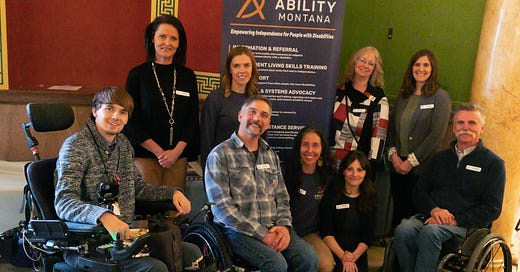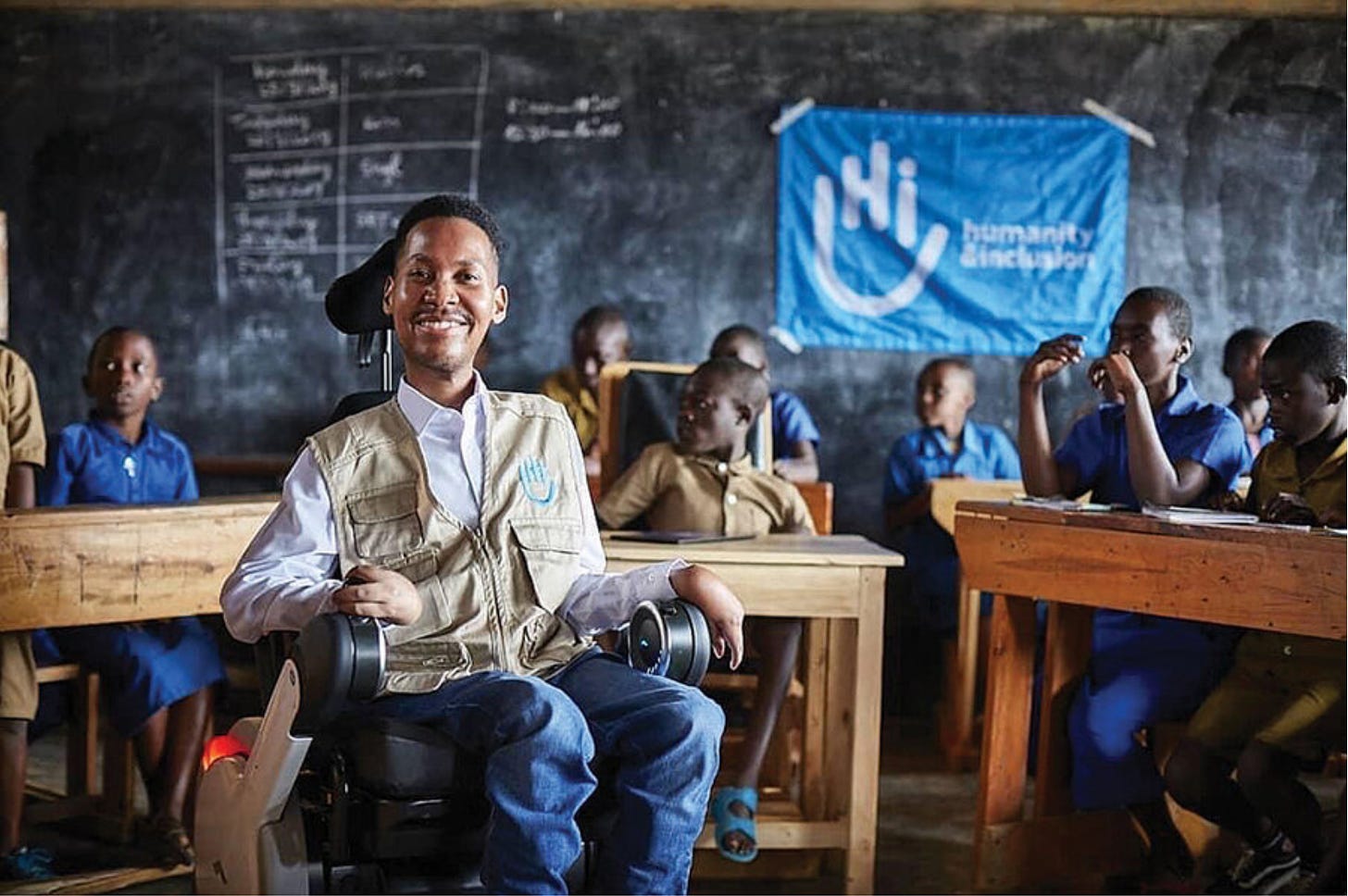I promised I’d give you more of the eloquent and lovely memoirist Eddie Ndopu, disability and social justice advocate and wheelchair user. I will be referring to some quotes from the cutting room floor of the interview I did with him for the Christian Science Monitor about his incredible book Sipping Dom Pérignon Through a Straw: Reimagining Success as a Disabled Achiever.
Today’s topic: the social v. medical model of disability. It’s pretty simple.
The medical model looks at a person’s disability as something that needs to be fixed or cured because it is inconvenient and/or uncomfortable for non-disabled people and something to be pitied.
The social model sees disability as a normal part of life — it’s not the person that needs to be fixed, it is the responsibility of societies to address accessibility and acceptance so that everyone can live a meaningful life.
When the late activist Judy Heumann was denied a teaching license because she used a wheelchair, she was furious. This happened after the Civil Rights Act was passed which was intended to end discrimination but which neglected to include disabled people. But it was before the Americans with Disabilities Act was signed into law. Adding insult to injury, the American Civil Liberties Union declined to represent Heumann in her battle against the Board of Education.
In her memoir, Being Heumann: An Unrepentant Memoir of a Disability Rights Activist, she wrote:
“If even the ACLU couldn’t understand how the Board of Ed’s actions were discriminatory, then we had to blow my story up. We had to make it crystal clear that the barriers we face to education, employment, transportation, to just living our lives, were not one-off problems. They were not medical problems to rehabilitate. We were not medical problems. I was never going to undo the damage polio had done to my nerve cells and walk again, nor was that my goal. The disabled veterans coming home from the Vietnam War were never going to grow their limbs back or heal their spinal cords and walk again. My friends with muscular dystrophy were never going to not have been born with muscular dystrophy. Accidents, illnesses, genetic conditions, neurological disorders, and aging are facts of the human condition, just as much as race or sex. So allowing schools and employers and city councils to design policies or buildings or buses in such a way that we couldn’t participate was a violation of our civil rights. Which the government had the responsibility to protect.”
It’s said the disability community is the largest minority that one can join at any time. After all, who among us won’t age and need help over time? If that’s not enough to convince you that we’re all lifted by accommodating disability, ponder this: the World Health Organization estimates that 1.3 billion people worldwide experience significant disability — that’s about 16% of the world’s population (1 in 6 people). So, if you aren’t disabled, you likely know someone who is (though, of course, you may not even know it if the disability isn’t readily apparent).
So back to Eddie. Though Eddie’s book is about his struggles attending Oxford University, he told me he’d had a completely different experience at Carleton University in Canada where he’d done his undergraduate work. Eddie needs 24/7 care attendants and finding them in England was challenging (he’d probably say that was an understatement). Carleton, on the other hand, has a dedicated 24-hour attendant services program utilizing the assistance of other students needing work and who are trained to provide care for disabled students. It was baked right into the college experience, Eddie said.
“I think they truly embraced the social model of disability in the sense that this was not an institutionalized setting in the medical sense of the word,” he’d told me. It is a model for “what it could look like for students with disabilities to be truly integrated into the university. The ethos of independent living, of autonomy, of agency — all of this was practiced on a day-to-day basis through this program.”
It demonstrated to him what was truly possible.
I moderate a group of neurodivergent people within the London Writers’ Salon — a wonderful worldwide community of people who gather online daily to write in silence and support each other in myriad ways too numerous to go into here (I’m writing with them right now — more than 160 folks all in their little boxes working on their projects).
Anyway, our neurodivergent group, known as the Divergers, meets virtually every month and we support each other in our private chat room with tips, tricks and other ideas to help each other thrive as creatives throughout the month.
At a recent meeting, an attendee felt uncomfortable because one person spoke of doing research with “children who have autism.” It triggered something for this person who is autistic and who prefers to have autistic people referred to as such — autistic people (not people with autism). Now, yes, this is a language thing and something I’ve written about previously (maybe ad nauseam). But it also brought up a discussion about the medical v. social model of disability.
In my post encouraging the group to discuss this in our chat room, I wrote:
“Person-first wording is rooted in ableism. It panders to non-disabled people and their discomfort in acknowledging and speaking about disability. And I think that’s the point. It’s a political statement to use identity-first language. I am dyslexic and neurodiverse which includes audio-processing issues so I may need tools to fully participate in the so-called normal world like captions during Zoom meetings. By naming myself neurodivergent, people will hopefully realize that I may be a little different and that I may need accommodations.”
I also mentioned how ableism has its origins in the medical model of disability. And with that, I asked others to chime in.
Here's what one member wrote:
“I just don’t consider my neurobiology to be a disorder. When my neurobiology collides with unfavorable circumstance to create a life-ruining spiral of self-perpetuating motivational paralysis — THAT'S a disorder, and I've got no problem calling it such and taking steps to correct it. But as far as I'm concerned, the underlying nature of my brain is not in and of itself something to be corrected — is not a disorder. After all, in more favorable circumstances, it's that exact same underlying nature that gives me wings.
“And this, I think, is the most important reason why, when given the opportunity, I express my neurodiversity as something I am rather than something I have. If I have it, the implication is that I got it and that it's some kind of disease or affliction to be cured or fixed. I don't believe it is. I believe my unique neurobiology is an integral part of me with no inherent moral charge, and though in some times and facets of in my life it's a disability that must be coped with, in other times and facets of my life it's a power that may be wielded.”1
Imagine a world where everyone can live a meaningful life. I believe it is possible.
What about you? Do you have a disability and, if so, how do you refer to yourself? And how can we convince the world that disability is NOT a curse, it’s simply a difference? And something that anyone can become at any time.
J. Halter in a London Writers’ Salon chat room (used with permission).






Hi Jodi, I'm putting a link to this post in my next post due out 1st Feb. Thank you, I hope the people who read what I write will find what you write helpful too! If you are interested my substack is You Do Know https://youdoknow.substack.com
It is a very interesting post, something I often wondered myself throughout my whole life. My mother and I had ABS (Amniotic Band Syndrome), I say 'my mother and I' because it happened in pregnancy. The medical side of my life was fairly strightforward, I had a number of operations in the first six years of my life to give me a viable foot and viable hands. The first surgery happened when I was 29 days (January 1954), the last surgery happened when I was six and a half (June 1960). Then society kicked in. Well meaning people kept telling me that it did not show, I interpreted that to mean I had something to hide. It was only in my late teens that I had the epihany that I had nothing to hide, society had to change attitude!